Business and Corporate Law: Analysis of Contract Rules and Case Study
VerifiedAdded on 2023/01/12
|8
|2748
|39
Report
AI Summary
This report delves into the intricacies of contract law within a business context. It outlines the essential elements required for a valid contract, including the rules of offer (specificity, communication, legal obligation, and certainty), acceptance (communication, specific person, and absolute terms), and revocation. The report also explores the postal rule, counteroffers, and the termination of offers. The core of the report involves the analysis of a case study involving James and Elizabeth, examining whether a valid contract was formed based on their communications regarding the sale of a van. The analysis considers the timing and nature of their communications, specifically whether Elizabeth's responses constituted a valid acceptance, given the presence of a counteroffer and the application of postal rules. The report concludes that no valid contract was formed between James and Elizabeth.
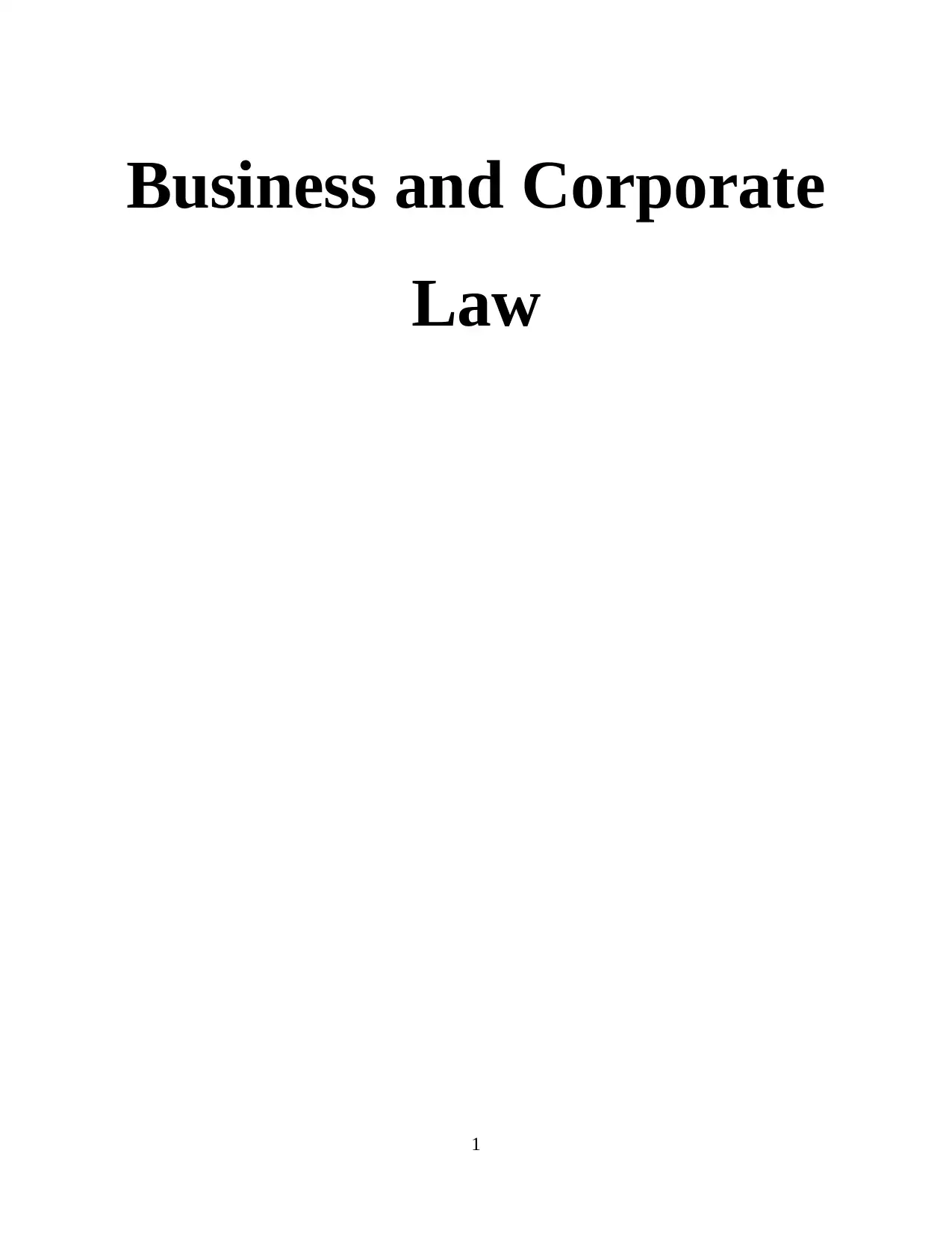
Business and Corporate
Law
1
Law
1
Paraphrase This Document
Need a fresh take? Get an instant paraphrase of this document with our AI Paraphraser
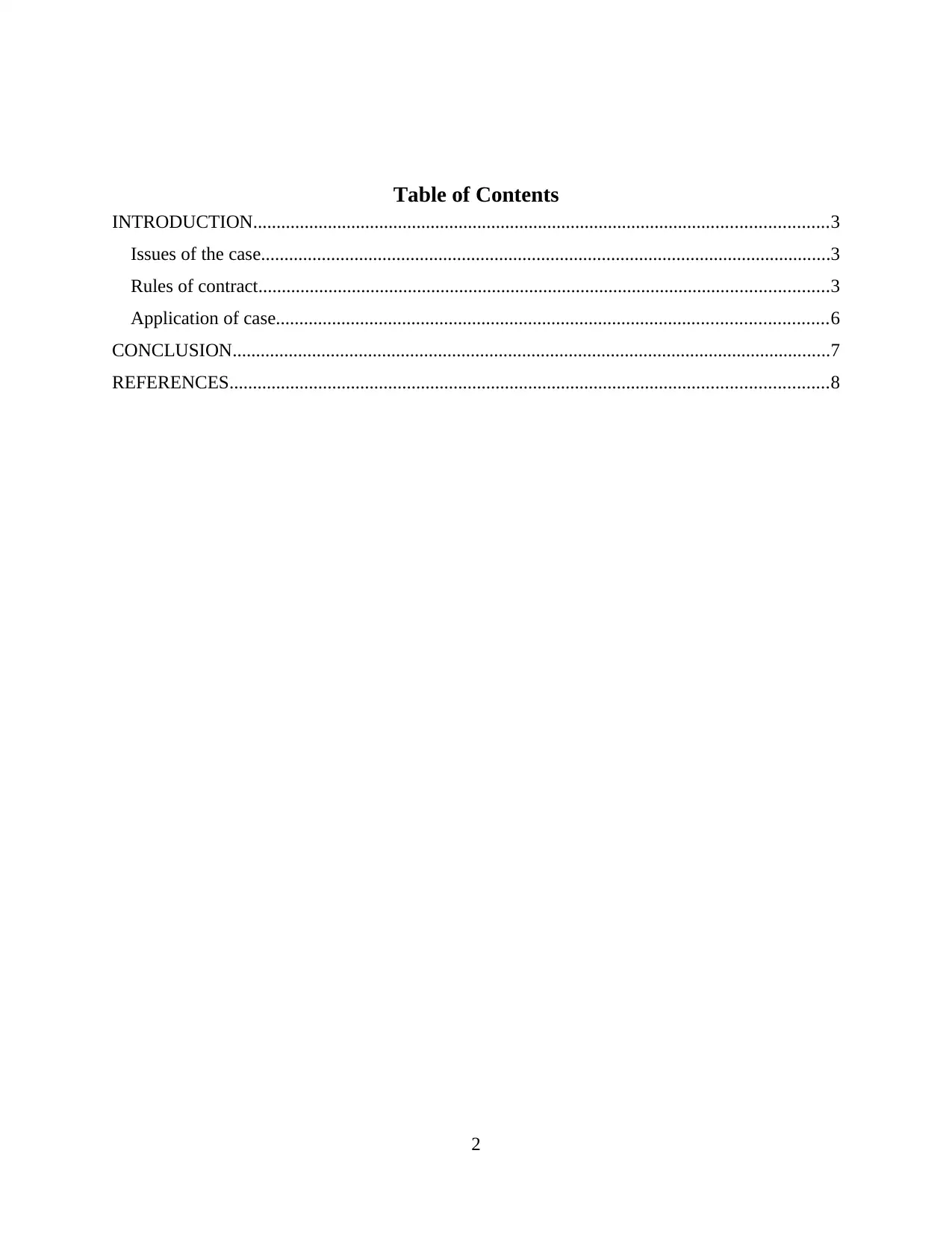
Table of Contents
INTRODUCTION...........................................................................................................................3
Issues of the case..........................................................................................................................3
Rules of contract..........................................................................................................................3
Application of case......................................................................................................................6
CONCLUSION................................................................................................................................7
REFERENCES................................................................................................................................8
2
INTRODUCTION...........................................................................................................................3
Issues of the case..........................................................................................................................3
Rules of contract..........................................................................................................................3
Application of case......................................................................................................................6
CONCLUSION................................................................................................................................7
REFERENCES................................................................................................................................8
2
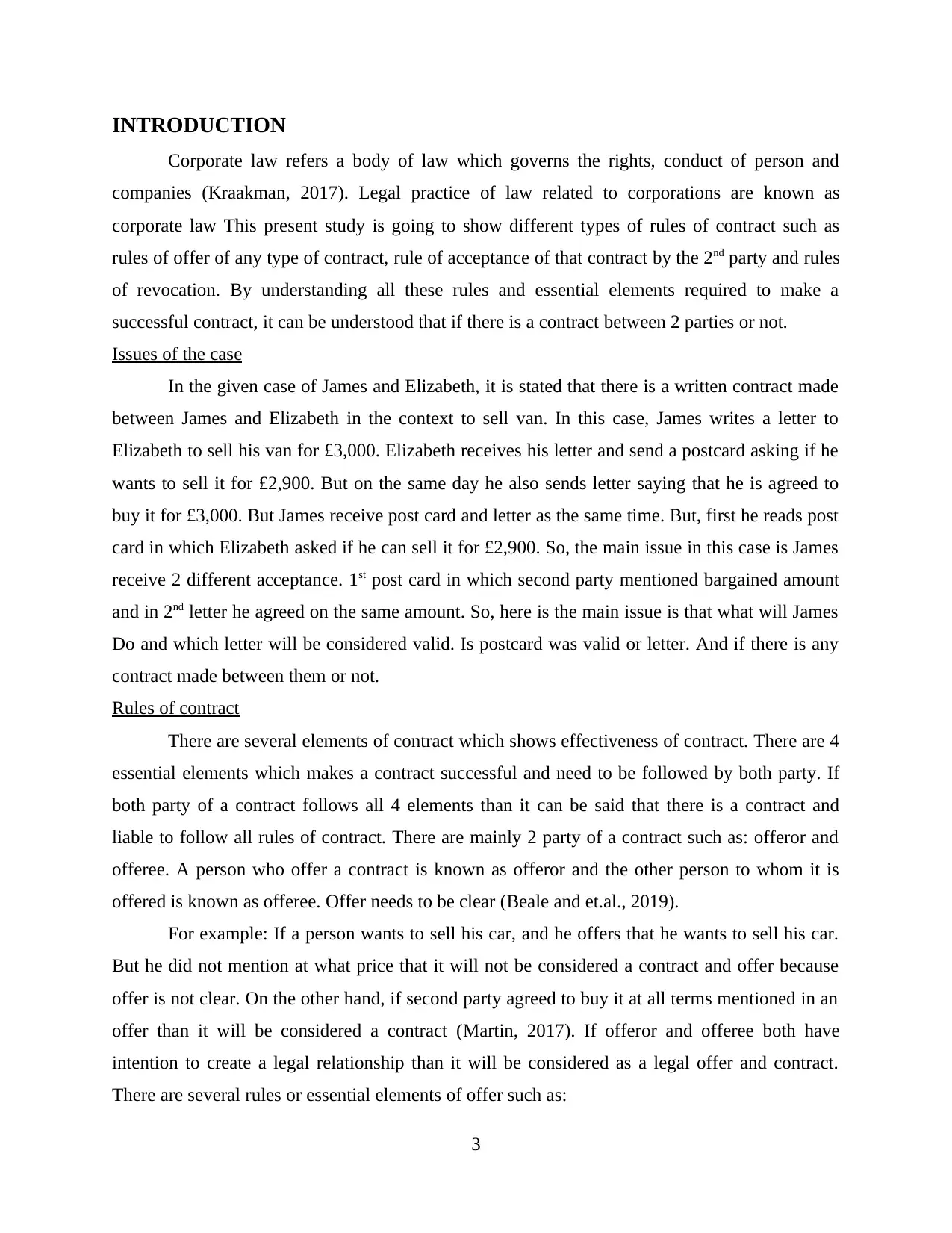
INTRODUCTION
Corporate law refers a body of law which governs the rights, conduct of person and
companies (Kraakman, 2017). Legal practice of law related to corporations are known as
corporate law This present study is going to show different types of rules of contract such as
rules of offer of any type of contract, rule of acceptance of that contract by the 2nd party and rules
of revocation. By understanding all these rules and essential elements required to make a
successful contract, it can be understood that if there is a contract between 2 parties or not.
Issues of the case
In the given case of James and Elizabeth, it is stated that there is a written contract made
between James and Elizabeth in the context to sell van. In this case, James writes a letter to
Elizabeth to sell his van for £3,000. Elizabeth receives his letter and send a postcard asking if he
wants to sell it for £2,900. But on the same day he also sends letter saying that he is agreed to
buy it for £3,000. But James receive post card and letter as the same time. But, first he reads post
card in which Elizabeth asked if he can sell it for £2,900. So, the main issue in this case is James
receive 2 different acceptance. 1st post card in which second party mentioned bargained amount
and in 2nd letter he agreed on the same amount. So, here is the main issue is that what will James
Do and which letter will be considered valid. Is postcard was valid or letter. And if there is any
contract made between them or not.
Rules of contract
There are several elements of contract which shows effectiveness of contract. There are 4
essential elements which makes a contract successful and need to be followed by both party. If
both party of a contract follows all 4 elements than it can be said that there is a contract and
liable to follow all rules of contract. There are mainly 2 party of a contract such as: offeror and
offeree. A person who offer a contract is known as offeror and the other person to whom it is
offered is known as offeree. Offer needs to be clear (Beale and et.al., 2019).
For example: If a person wants to sell his car, and he offers that he wants to sell his car.
But he did not mention at what price that it will not be considered a contract and offer because
offer is not clear. On the other hand, if second party agreed to buy it at all terms mentioned in an
offer than it will be considered a contract (Martin, 2017). If offeror and offeree both have
intention to create a legal relationship than it will be considered as a legal offer and contract.
There are several rules or essential elements of offer such as:
3
Corporate law refers a body of law which governs the rights, conduct of person and
companies (Kraakman, 2017). Legal practice of law related to corporations are known as
corporate law This present study is going to show different types of rules of contract such as
rules of offer of any type of contract, rule of acceptance of that contract by the 2nd party and rules
of revocation. By understanding all these rules and essential elements required to make a
successful contract, it can be understood that if there is a contract between 2 parties or not.
Issues of the case
In the given case of James and Elizabeth, it is stated that there is a written contract made
between James and Elizabeth in the context to sell van. In this case, James writes a letter to
Elizabeth to sell his van for £3,000. Elizabeth receives his letter and send a postcard asking if he
wants to sell it for £2,900. But on the same day he also sends letter saying that he is agreed to
buy it for £3,000. But James receive post card and letter as the same time. But, first he reads post
card in which Elizabeth asked if he can sell it for £2,900. So, the main issue in this case is James
receive 2 different acceptance. 1st post card in which second party mentioned bargained amount
and in 2nd letter he agreed on the same amount. So, here is the main issue is that what will James
Do and which letter will be considered valid. Is postcard was valid or letter. And if there is any
contract made between them or not.
Rules of contract
There are several elements of contract which shows effectiveness of contract. There are 4
essential elements which makes a contract successful and need to be followed by both party. If
both party of a contract follows all 4 elements than it can be said that there is a contract and
liable to follow all rules of contract. There are mainly 2 party of a contract such as: offeror and
offeree. A person who offer a contract is known as offeror and the other person to whom it is
offered is known as offeree. Offer needs to be clear (Beale and et.al., 2019).
For example: If a person wants to sell his car, and he offers that he wants to sell his car.
But he did not mention at what price that it will not be considered a contract and offer because
offer is not clear. On the other hand, if second party agreed to buy it at all terms mentioned in an
offer than it will be considered a contract (Martin, 2017). If offeror and offeree both have
intention to create a legal relationship than it will be considered as a legal offer and contract.
There are several rules or essential elements of offer such as:
3
⊘ This is a preview!⊘
Do you want full access?
Subscribe today to unlock all pages.

Trusted by 1+ million students worldwide
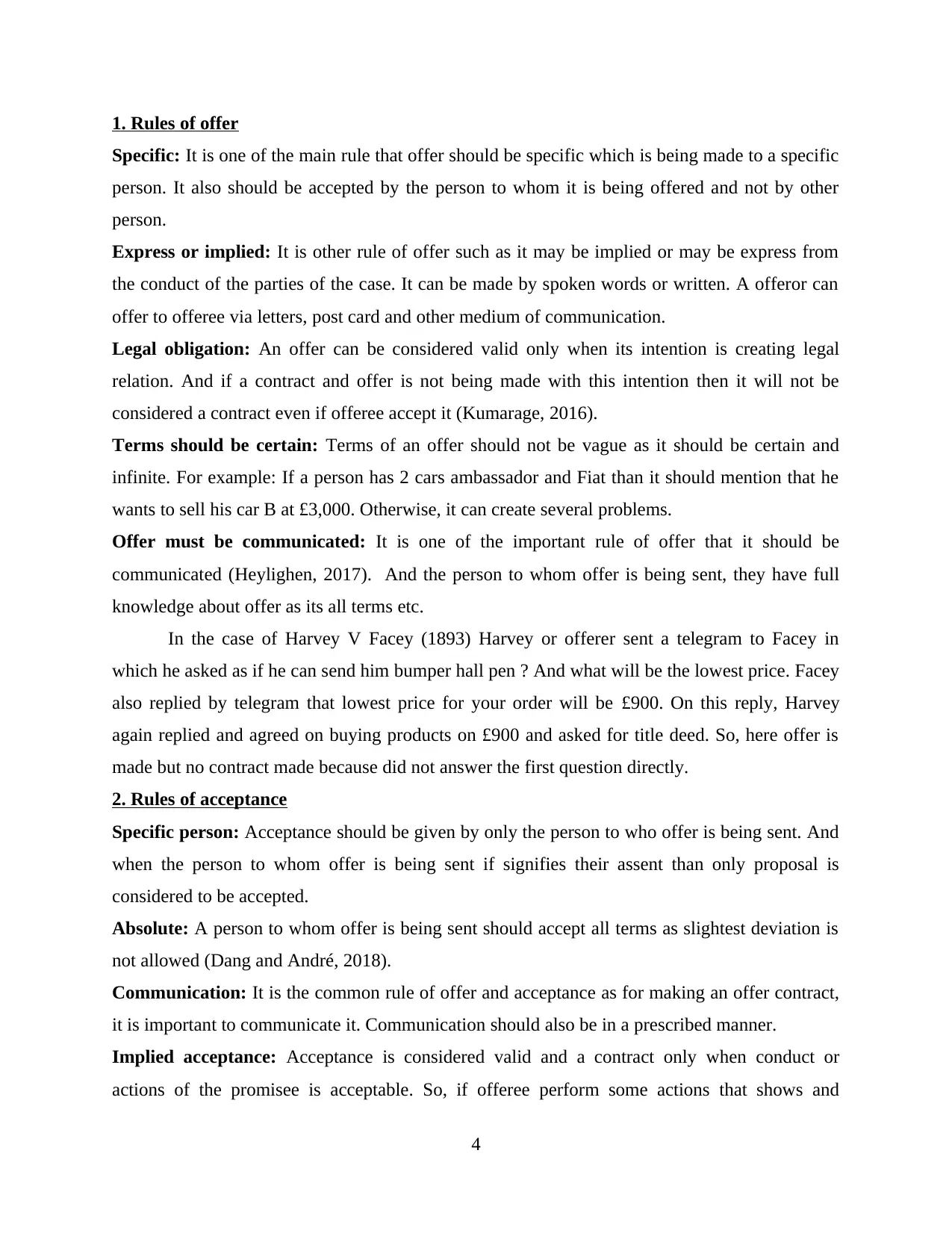
1. Rules of offer
Specific: It is one of the main rule that offer should be specific which is being made to a specific
person. It also should be accepted by the person to whom it is being offered and not by other
person.
Express or implied: It is other rule of offer such as it may be implied or may be express from
the conduct of the parties of the case. It can be made by spoken words or written. A offeror can
offer to offeree via letters, post card and other medium of communication.
Legal obligation: An offer can be considered valid only when its intention is creating legal
relation. And if a contract and offer is not being made with this intention then it will not be
considered a contract even if offeree accept it (Kumarage, 2016).
Terms should be certain: Terms of an offer should not be vague as it should be certain and
infinite. For example: If a person has 2 cars ambassador and Fiat than it should mention that he
wants to sell his car B at £3,000. Otherwise, it can create several problems.
Offer must be communicated: It is one of the important rule of offer that it should be
communicated (Heylighen, 2017). And the person to whom offer is being sent, they have full
knowledge about offer as its all terms etc.
In the case of Harvey V Facey (1893) Harvey or offerer sent a telegram to Facey in
which he asked as if he can send him bumper hall pen ? And what will be the lowest price. Facey
also replied by telegram that lowest price for your order will be £900. On this reply, Harvey
again replied and agreed on buying products on £900 and asked for title deed. So, here offer is
made but no contract made because did not answer the first question directly.
2. Rules of acceptance
Specific person: Acceptance should be given by only the person to who offer is being sent. And
when the person to whom offer is being sent if signifies their assent than only proposal is
considered to be accepted.
Absolute: A person to whom offer is being sent should accept all terms as slightest deviation is
not allowed (Dang and André, 2018).
Communication: It is the common rule of offer and acceptance as for making an offer contract,
it is important to communicate it. Communication should also be in a prescribed manner.
Implied acceptance: Acceptance is considered valid and a contract only when conduct or
actions of the promisee is acceptable. So, if offeree perform some actions that shows and
4
Specific: It is one of the main rule that offer should be specific which is being made to a specific
person. It also should be accepted by the person to whom it is being offered and not by other
person.
Express or implied: It is other rule of offer such as it may be implied or may be express from
the conduct of the parties of the case. It can be made by spoken words or written. A offeror can
offer to offeree via letters, post card and other medium of communication.
Legal obligation: An offer can be considered valid only when its intention is creating legal
relation. And if a contract and offer is not being made with this intention then it will not be
considered a contract even if offeree accept it (Kumarage, 2016).
Terms should be certain: Terms of an offer should not be vague as it should be certain and
infinite. For example: If a person has 2 cars ambassador and Fiat than it should mention that he
wants to sell his car B at £3,000. Otherwise, it can create several problems.
Offer must be communicated: It is one of the important rule of offer that it should be
communicated (Heylighen, 2017). And the person to whom offer is being sent, they have full
knowledge about offer as its all terms etc.
In the case of Harvey V Facey (1893) Harvey or offerer sent a telegram to Facey in
which he asked as if he can send him bumper hall pen ? And what will be the lowest price. Facey
also replied by telegram that lowest price for your order will be £900. On this reply, Harvey
again replied and agreed on buying products on £900 and asked for title deed. So, here offer is
made but no contract made because did not answer the first question directly.
2. Rules of acceptance
Specific person: Acceptance should be given by only the person to who offer is being sent. And
when the person to whom offer is being sent if signifies their assent than only proposal is
considered to be accepted.
Absolute: A person to whom offer is being sent should accept all terms as slightest deviation is
not allowed (Dang and André, 2018).
Communication: It is the common rule of offer and acceptance as for making an offer contract,
it is important to communicate it. Communication should also be in a prescribed manner.
Implied acceptance: Acceptance is considered valid and a contract only when conduct or
actions of the promisee is acceptable. So, if offeree perform some actions that shows and
4
Paraphrase This Document
Need a fresh take? Get an instant paraphrase of this document with our AI Paraphraser
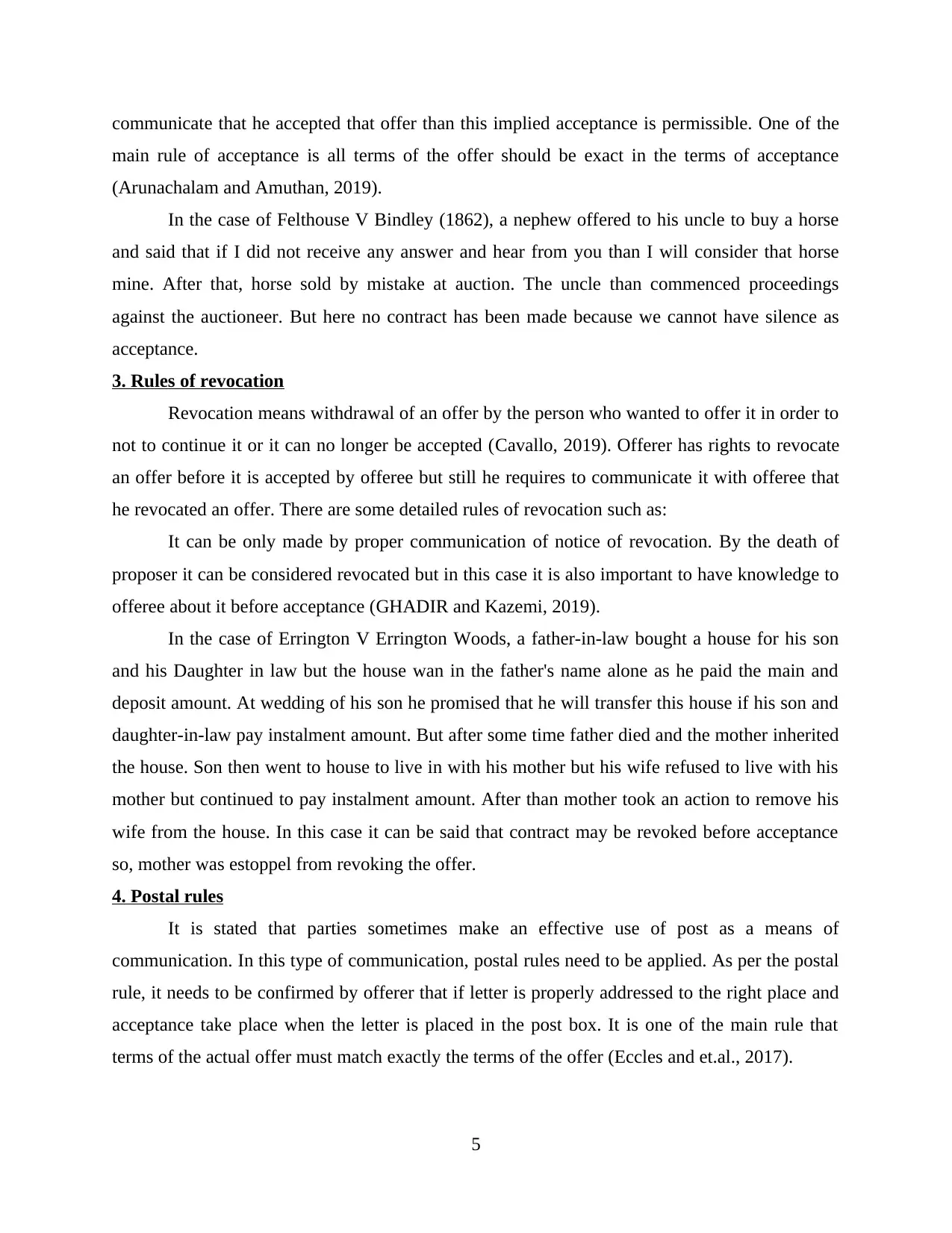
communicate that he accepted that offer than this implied acceptance is permissible. One of the
main rule of acceptance is all terms of the offer should be exact in the terms of acceptance
(Arunachalam and Amuthan, 2019).
In the case of Felthouse V Bindley (1862), a nephew offered to his uncle to buy a horse
and said that if I did not receive any answer and hear from you than I will consider that horse
mine. After that, horse sold by mistake at auction. The uncle than commenced proceedings
against the auctioneer. But here no contract has been made because we cannot have silence as
acceptance.
3. Rules of revocation
Revocation means withdrawal of an offer by the person who wanted to offer it in order to
not to continue it or it can no longer be accepted (Cavallo, 2019). Offerer has rights to revocate
an offer before it is accepted by offeree but still he requires to communicate it with offeree that
he revocated an offer. There are some detailed rules of revocation such as:
It can be only made by proper communication of notice of revocation. By the death of
proposer it can be considered revocated but in this case it is also important to have knowledge to
offeree about it before acceptance (GHADIR and Kazemi, 2019).
In the case of Errington V Errington Woods, a father-in-law bought a house for his son
and his Daughter in law but the house wan in the father's name alone as he paid the main and
deposit amount. At wedding of his son he promised that he will transfer this house if his son and
daughter-in-law pay instalment amount. But after some time father died and the mother inherited
the house. Son then went to house to live in with his mother but his wife refused to live with his
mother but continued to pay instalment amount. After than mother took an action to remove his
wife from the house. In this case it can be said that contract may be revoked before acceptance
so, mother was estoppel from revoking the offer.
4. Postal rules
It is stated that parties sometimes make an effective use of post as a means of
communication. In this type of communication, postal rules need to be applied. As per the postal
rule, it needs to be confirmed by offerer that if letter is properly addressed to the right place and
acceptance take place when the letter is placed in the post box. It is one of the main rule that
terms of the actual offer must match exactly the terms of the offer (Eccles and et.al., 2017).
5
main rule of acceptance is all terms of the offer should be exact in the terms of acceptance
(Arunachalam and Amuthan, 2019).
In the case of Felthouse V Bindley (1862), a nephew offered to his uncle to buy a horse
and said that if I did not receive any answer and hear from you than I will consider that horse
mine. After that, horse sold by mistake at auction. The uncle than commenced proceedings
against the auctioneer. But here no contract has been made because we cannot have silence as
acceptance.
3. Rules of revocation
Revocation means withdrawal of an offer by the person who wanted to offer it in order to
not to continue it or it can no longer be accepted (Cavallo, 2019). Offerer has rights to revocate
an offer before it is accepted by offeree but still he requires to communicate it with offeree that
he revocated an offer. There are some detailed rules of revocation such as:
It can be only made by proper communication of notice of revocation. By the death of
proposer it can be considered revocated but in this case it is also important to have knowledge to
offeree about it before acceptance (GHADIR and Kazemi, 2019).
In the case of Errington V Errington Woods, a father-in-law bought a house for his son
and his Daughter in law but the house wan in the father's name alone as he paid the main and
deposit amount. At wedding of his son he promised that he will transfer this house if his son and
daughter-in-law pay instalment amount. But after some time father died and the mother inherited
the house. Son then went to house to live in with his mother but his wife refused to live with his
mother but continued to pay instalment amount. After than mother took an action to remove his
wife from the house. In this case it can be said that contract may be revoked before acceptance
so, mother was estoppel from revoking the offer.
4. Postal rules
It is stated that parties sometimes make an effective use of post as a means of
communication. In this type of communication, postal rules need to be applied. As per the postal
rule, it needs to be confirmed by offerer that if letter is properly addressed to the right place and
acceptance take place when the letter is placed in the post box. It is one of the main rule that
terms of the actual offer must match exactly the terms of the offer (Eccles and et.al., 2017).
5
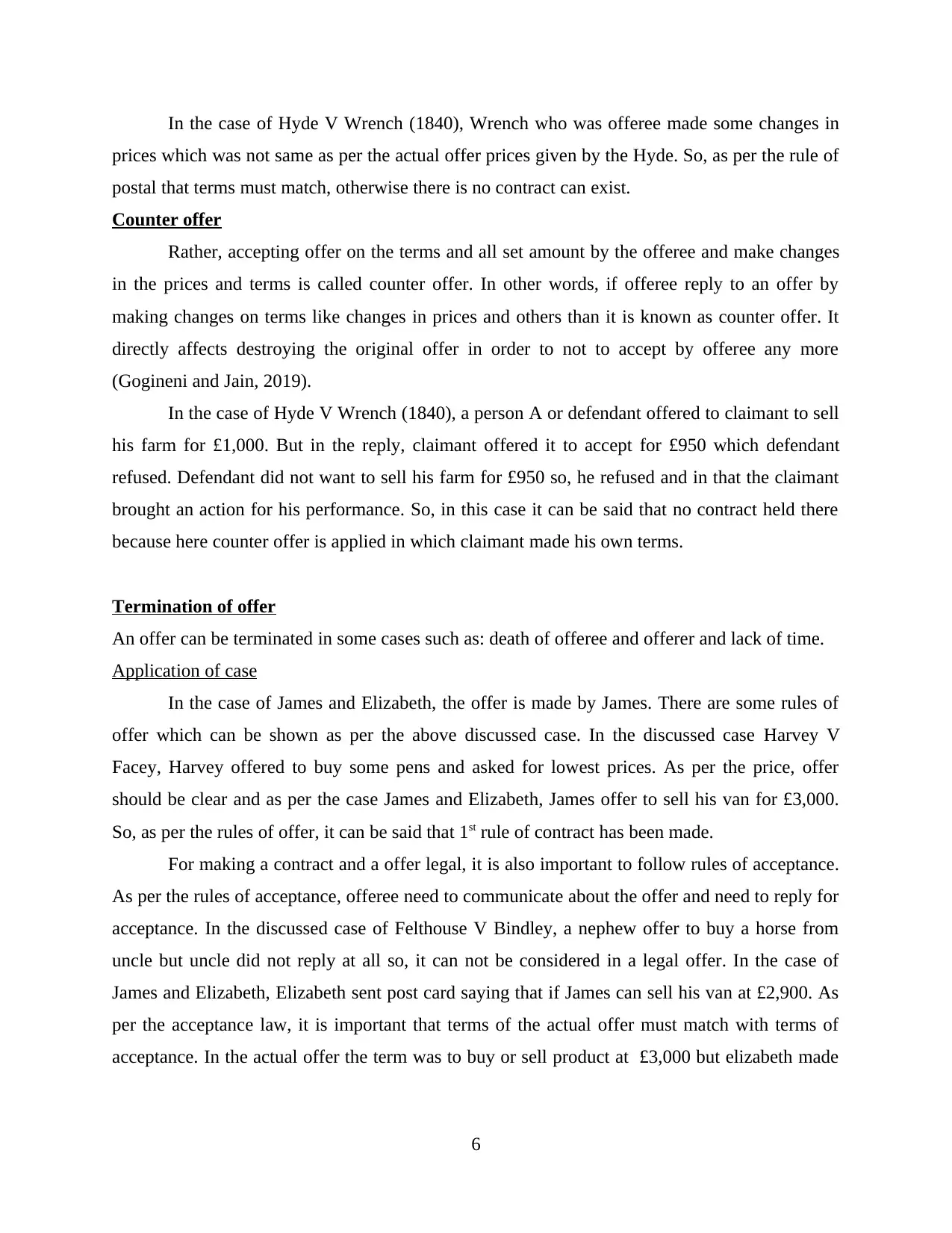
In the case of Hyde V Wrench (1840), Wrench who was offeree made some changes in
prices which was not same as per the actual offer prices given by the Hyde. So, as per the rule of
postal that terms must match, otherwise there is no contract can exist.
Counter offer
Rather, accepting offer on the terms and all set amount by the offeree and make changes
in the prices and terms is called counter offer. In other words, if offeree reply to an offer by
making changes on terms like changes in prices and others than it is known as counter offer. It
directly affects destroying the original offer in order to not to accept by offeree any more
(Gogineni and Jain, 2019).
In the case of Hyde V Wrench (1840), a person A or defendant offered to claimant to sell
his farm for £1,000. But in the reply, claimant offered it to accept for £950 which defendant
refused. Defendant did not want to sell his farm for £950 so, he refused and in that the claimant
brought an action for his performance. So, in this case it can be said that no contract held there
because here counter offer is applied in which claimant made his own terms.
Termination of offer
An offer can be terminated in some cases such as: death of offeree and offerer and lack of time.
Application of case
In the case of James and Elizabeth, the offer is made by James. There are some rules of
offer which can be shown as per the above discussed case. In the discussed case Harvey V
Facey, Harvey offered to buy some pens and asked for lowest prices. As per the price, offer
should be clear and as per the case James and Elizabeth, James offer to sell his van for £3,000.
So, as per the rules of offer, it can be said that 1st rule of contract has been made.
For making a contract and a offer legal, it is also important to follow rules of acceptance.
As per the rules of acceptance, offeree need to communicate about the offer and need to reply for
acceptance. In the discussed case of Felthouse V Bindley, a nephew offer to buy a horse from
uncle but uncle did not reply at all so, it can not be considered in a legal offer. In the case of
James and Elizabeth, Elizabeth sent post card saying that if James can sell his van at £2,900. As
per the acceptance law, it is important that terms of the actual offer must match with terms of
acceptance. In the actual offer the term was to buy or sell product at £3,000 but elizabeth made
6
prices which was not same as per the actual offer prices given by the Hyde. So, as per the rule of
postal that terms must match, otherwise there is no contract can exist.
Counter offer
Rather, accepting offer on the terms and all set amount by the offeree and make changes
in the prices and terms is called counter offer. In other words, if offeree reply to an offer by
making changes on terms like changes in prices and others than it is known as counter offer. It
directly affects destroying the original offer in order to not to accept by offeree any more
(Gogineni and Jain, 2019).
In the case of Hyde V Wrench (1840), a person A or defendant offered to claimant to sell
his farm for £1,000. But in the reply, claimant offered it to accept for £950 which defendant
refused. Defendant did not want to sell his farm for £950 so, he refused and in that the claimant
brought an action for his performance. So, in this case it can be said that no contract held there
because here counter offer is applied in which claimant made his own terms.
Termination of offer
An offer can be terminated in some cases such as: death of offeree and offerer and lack of time.
Application of case
In the case of James and Elizabeth, the offer is made by James. There are some rules of
offer which can be shown as per the above discussed case. In the discussed case Harvey V
Facey, Harvey offered to buy some pens and asked for lowest prices. As per the price, offer
should be clear and as per the case James and Elizabeth, James offer to sell his van for £3,000.
So, as per the rules of offer, it can be said that 1st rule of contract has been made.
For making a contract and a offer legal, it is also important to follow rules of acceptance.
As per the rules of acceptance, offeree need to communicate about the offer and need to reply for
acceptance. In the discussed case of Felthouse V Bindley, a nephew offer to buy a horse from
uncle but uncle did not reply at all so, it can not be considered in a legal offer. In the case of
James and Elizabeth, Elizabeth sent post card saying that if James can sell his van at £2,900. As
per the acceptance law, it is important that terms of the actual offer must match with terms of
acceptance. In the actual offer the term was to buy or sell product at £3,000 but elizabeth made
6
⊘ This is a preview!⊘
Do you want full access?
Subscribe today to unlock all pages.

Trusted by 1+ million students worldwide
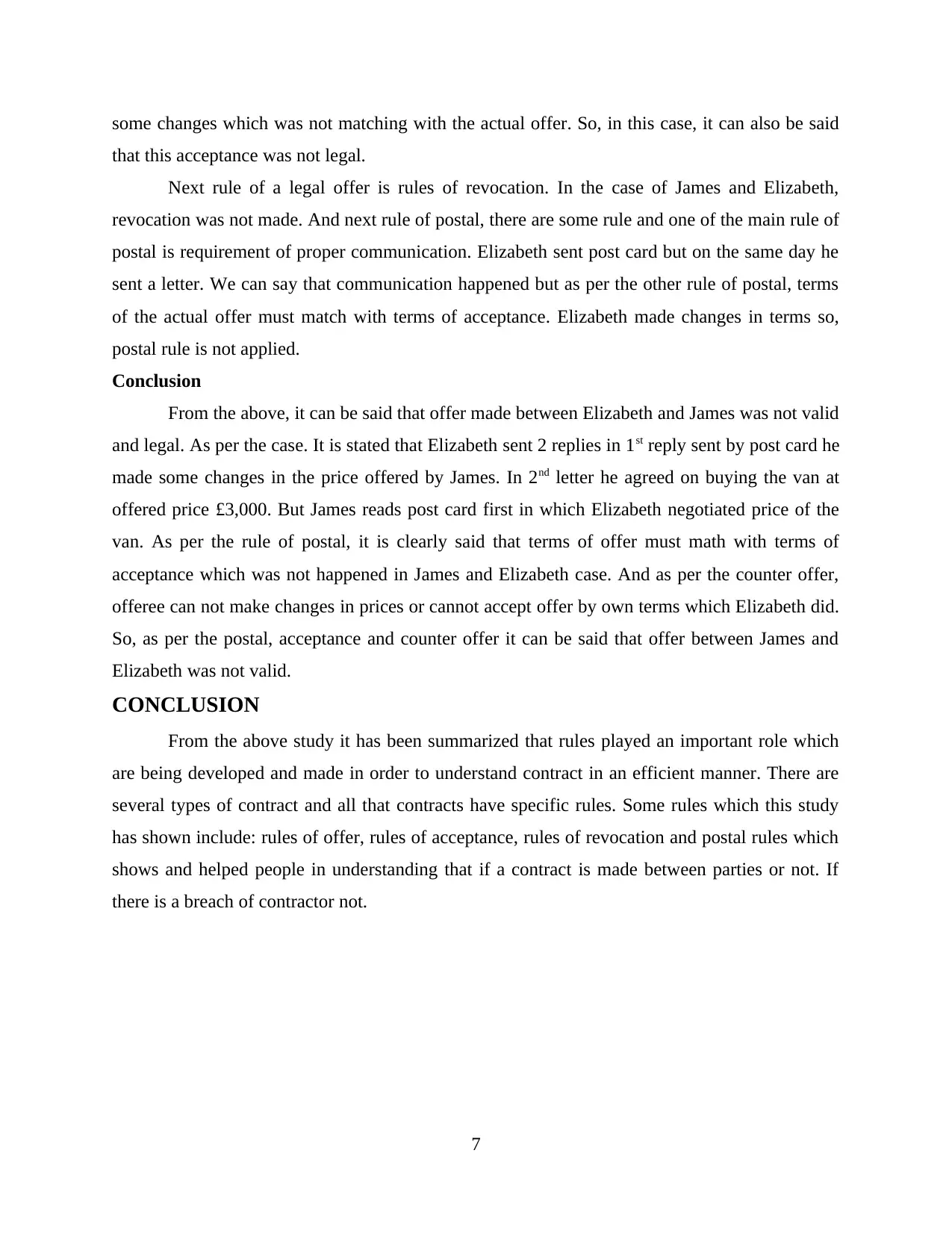
some changes which was not matching with the actual offer. So, in this case, it can also be said
that this acceptance was not legal.
Next rule of a legal offer is rules of revocation. In the case of James and Elizabeth,
revocation was not made. And next rule of postal, there are some rule and one of the main rule of
postal is requirement of proper communication. Elizabeth sent post card but on the same day he
sent a letter. We can say that communication happened but as per the other rule of postal, terms
of the actual offer must match with terms of acceptance. Elizabeth made changes in terms so,
postal rule is not applied.
Conclusion
From the above, it can be said that offer made between Elizabeth and James was not valid
and legal. As per the case. It is stated that Elizabeth sent 2 replies in 1st reply sent by post card he
made some changes in the price offered by James. In 2nd letter he agreed on buying the van at
offered price £3,000. But James reads post card first in which Elizabeth negotiated price of the
van. As per the rule of postal, it is clearly said that terms of offer must math with terms of
acceptance which was not happened in James and Elizabeth case. And as per the counter offer,
offeree can not make changes in prices or cannot accept offer by own terms which Elizabeth did.
So, as per the postal, acceptance and counter offer it can be said that offer between James and
Elizabeth was not valid.
CONCLUSION
From the above study it has been summarized that rules played an important role which
are being developed and made in order to understand contract in an efficient manner. There are
several types of contract and all that contracts have specific rules. Some rules which this study
has shown include: rules of offer, rules of acceptance, rules of revocation and postal rules which
shows and helped people in understanding that if a contract is made between parties or not. If
there is a breach of contractor not.
7
that this acceptance was not legal.
Next rule of a legal offer is rules of revocation. In the case of James and Elizabeth,
revocation was not made. And next rule of postal, there are some rule and one of the main rule of
postal is requirement of proper communication. Elizabeth sent post card but on the same day he
sent a letter. We can say that communication happened but as per the other rule of postal, terms
of the actual offer must match with terms of acceptance. Elizabeth made changes in terms so,
postal rule is not applied.
Conclusion
From the above, it can be said that offer made between Elizabeth and James was not valid
and legal. As per the case. It is stated that Elizabeth sent 2 replies in 1st reply sent by post card he
made some changes in the price offered by James. In 2nd letter he agreed on buying the van at
offered price £3,000. But James reads post card first in which Elizabeth negotiated price of the
van. As per the rule of postal, it is clearly said that terms of offer must math with terms of
acceptance which was not happened in James and Elizabeth case. And as per the counter offer,
offeree can not make changes in prices or cannot accept offer by own terms which Elizabeth did.
So, as per the postal, acceptance and counter offer it can be said that offer between James and
Elizabeth was not valid.
CONCLUSION
From the above study it has been summarized that rules played an important role which
are being developed and made in order to understand contract in an efficient manner. There are
several types of contract and all that contracts have specific rules. Some rules which this study
has shown include: rules of offer, rules of acceptance, rules of revocation and postal rules which
shows and helped people in understanding that if a contract is made between parties or not. If
there is a breach of contractor not.
7
Paraphrase This Document
Need a fresh take? Get an instant paraphrase of this document with our AI Paraphraser
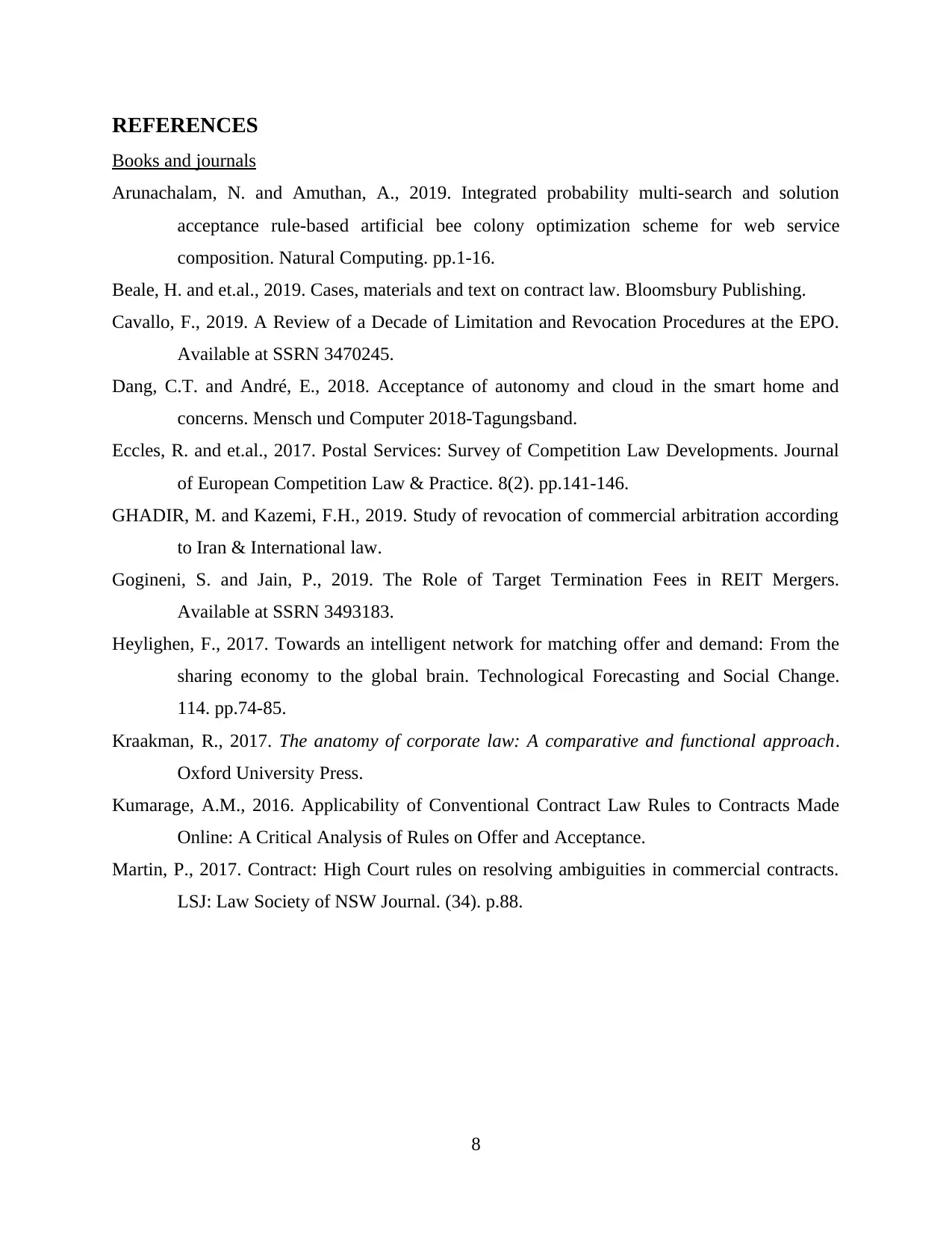
REFERENCES
Books and journals
Arunachalam, N. and Amuthan, A., 2019. Integrated probability multi-search and solution
acceptance rule-based artificial bee colony optimization scheme for web service
composition. Natural Computing. pp.1-16.
Beale, H. and et.al., 2019. Cases, materials and text on contract law. Bloomsbury Publishing.
Cavallo, F., 2019. A Review of a Decade of Limitation and Revocation Procedures at the EPO.
Available at SSRN 3470245.
Dang, C.T. and André, E., 2018. Acceptance of autonomy and cloud in the smart home and
concerns. Mensch und Computer 2018-Tagungsband.
Eccles, R. and et.al., 2017. Postal Services: Survey of Competition Law Developments. Journal
of European Competition Law & Practice. 8(2). pp.141-146.
GHADIR, M. and Kazemi, F.H., 2019. Study of revocation of commercial arbitration according
to Iran & International law.
Gogineni, S. and Jain, P., 2019. The Role of Target Termination Fees in REIT Mergers.
Available at SSRN 3493183.
Heylighen, F., 2017. Towards an intelligent network for matching offer and demand: From the
sharing economy to the global brain. Technological Forecasting and Social Change.
114. pp.74-85.
Kraakman, R., 2017. The anatomy of corporate law: A comparative and functional approach.
Oxford University Press.
Kumarage, A.M., 2016. Applicability of Conventional Contract Law Rules to Contracts Made
Online: A Critical Analysis of Rules on Offer and Acceptance.
Martin, P., 2017. Contract: High Court rules on resolving ambiguities in commercial contracts.
LSJ: Law Society of NSW Journal. (34). p.88.
8
Books and journals
Arunachalam, N. and Amuthan, A., 2019. Integrated probability multi-search and solution
acceptance rule-based artificial bee colony optimization scheme for web service
composition. Natural Computing. pp.1-16.
Beale, H. and et.al., 2019. Cases, materials and text on contract law. Bloomsbury Publishing.
Cavallo, F., 2019. A Review of a Decade of Limitation and Revocation Procedures at the EPO.
Available at SSRN 3470245.
Dang, C.T. and André, E., 2018. Acceptance of autonomy and cloud in the smart home and
concerns. Mensch und Computer 2018-Tagungsband.
Eccles, R. and et.al., 2017. Postal Services: Survey of Competition Law Developments. Journal
of European Competition Law & Practice. 8(2). pp.141-146.
GHADIR, M. and Kazemi, F.H., 2019. Study of revocation of commercial arbitration according
to Iran & International law.
Gogineni, S. and Jain, P., 2019. The Role of Target Termination Fees in REIT Mergers.
Available at SSRN 3493183.
Heylighen, F., 2017. Towards an intelligent network for matching offer and demand: From the
sharing economy to the global brain. Technological Forecasting and Social Change.
114. pp.74-85.
Kraakman, R., 2017. The anatomy of corporate law: A comparative and functional approach.
Oxford University Press.
Kumarage, A.M., 2016. Applicability of Conventional Contract Law Rules to Contracts Made
Online: A Critical Analysis of Rules on Offer and Acceptance.
Martin, P., 2017. Contract: High Court rules on resolving ambiguities in commercial contracts.
LSJ: Law Society of NSW Journal. (34). p.88.
8
1 out of 8
Related Documents
Your All-in-One AI-Powered Toolkit for Academic Success.
+13062052269
info@desklib.com
Available 24*7 on WhatsApp / Email
![[object Object]](/_next/static/media/star-bottom.7253800d.svg)
Unlock your academic potential
Copyright © 2020–2026 A2Z Services. All Rights Reserved. Developed and managed by ZUCOL.





